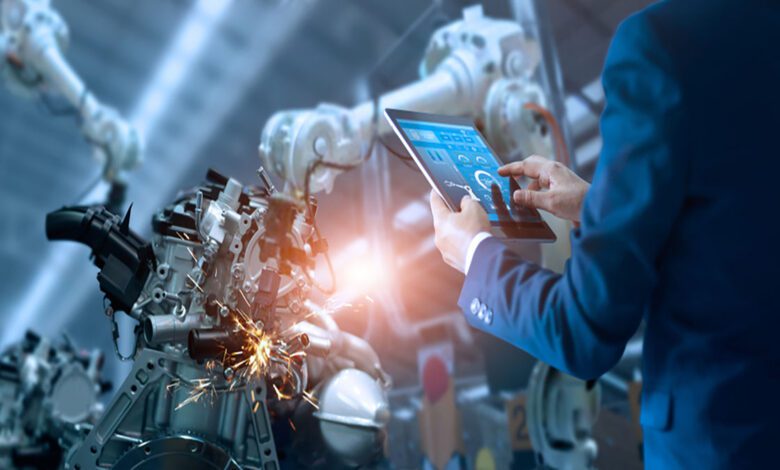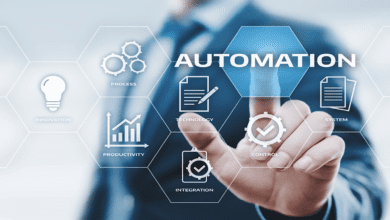
The Future Of Work: How AI and World Industrial Automation Are Changing The Job Market
The world industrial automation has reached new heights and is causing massive changes to the job market worldwide. As we are on the edge of a new age defined by digital revolution is crucial to comprehend the many facets of the impact on automation as well as AI on how we live, work and develop our careers.
In this lengthy discussion we’ll look at the change that is currently taking place in the work market, examine the issues and opportunities that it brings, and look at what the professional landscape could be like in the near future.
Wizard at Work The evolution of job roles
The job roles are changing with the ever-changing speed in automation as well as AI integration. The jobs that were once requiring a significant amount of human input are now completely or partially automated, with remarkable accuracy and efficacy. It’s not all about job loss, it’s about the changing of jobs. Certain roles are being displaced, while others are evolving to require a different set of soft and digital skills.
Re-skilling and Upskilling: Employees are increasingly discovering the need to improve their skills or reskill in order to meet the demands of their changing tasks. The workforce of the future will depend on a workforce that is able to effortlessly transition to new roles. Businesses that focus on fostering the culture of learning for life will be well-equipped to meet the challenges of the future.
In the age of industrial automation trends as well as technological advancements like the internet of things industrial automation, when you automatize an industry to industrial process automation it can result in significant shifts in the requirements for jobs and the skills required.
The New Normal Work Functions in Transition
Certain job functions have seen an evident shift
- The data Analysis as well as AI: AI algorithms are getting better at sorting through huge data sets and transforming fields that rely on data analysis.
- Customer service: Chatbots and AI assistants are changing the way we respond to customer service. Humans are dealing with more complicated or emotional queries.
- Manufacturing the rise in robots and smart technologies will lead to more efficient and autonomous manufacturing processes. This requires engineers to adopt an focused on IT.
Resolving the Challenge, Discovering The Opportunities

The transition to a more efficient workplace can be challenging however, it can also open doors to new opportunities. The employment market is changed with every advance in technology. Both individuals and companies must be able to take advantage of the new opportunities.
How to navigate the transition
The process of adjusting to the changing world of automation isn’t an easy task. Many people have to face the challenge of reassessing their skills and career path. There is a strong resistance to change, which needs to be overcome with proper guidance and assistance mechanisms. The sharing of information about the possibility of loss of jobs, as well as job opportunities in the field is a tremendous assistance to employees.
The Reskilling Gap
The organization must play an active part in bridging the gap between reskilling and education. Initiatives to continue learning and professional development do not just benefit the individual but will also help to boost the talent pipeline within the company. The goal isn’t just to refresh skills, but to create a culture that is flexible and recognizes the potential in adapting.
Employment Creation within an automated world
Although automation could eliminate certain jobs, it’s also the catalyst for job growth. new industries and job descriptions are emerging from the intersection of technology and traditional jobs. While automation can streamline specific tasks opens up more creative and strategic responsibilities for human beings.
Innovation and Entrepreneurship
The increasing accessibility of technology via automation creates a fertile field for entrepreneurship and innovation. People who have a clear idea of how to make the most of technology are attempting to find new ways to create value and develop their own niches as professionals.
The AI-related HR
The impact from AI and automation don’t end with job titles. They penetrate into the very structure of recruitment and HR processes, transforming the way that organizations find, manage, and develop talent.
Recruitment Redefined
AI’s arrival on the world of recruitment is a game changer. Algorithms today sort through applications for jobs, sifting through candidates more efficiently than ever. Video interviews and AI-powered assessment are becoming more commonplace, changing the process of selecting candidates.
HR Strategies to prepare for the Automated Age
Responding to these shifts, HR managers now focus on developing the development of a workforce well-equipped with the right mix of soft and technical skills. Human resource strategies are changing to encourage employees to pursue lifelong learning and offer career advancement routes within the organization.
Building a resilient workforce
If you have the right HR strategy companies can create employees who are not just prepared to adapt to the changes that will come from automation, but is equipped to lead these shifts. The ability of AI to be balanced with human aptitude and imagination is vital to a resilient workforce.
World Industrial Automation Trends

Industrial automation trends around the world influence what the work future will look like faster than we think. From factories and professional service, the latest trends in automation are setting the stage for the next phase in the field of employment.
Industries 4.0 and Beyond
4. The Fourth Industrial Revolution, commonly referred to by the name Industry 4.0, is marked by the integration of cyberphysical systems. This is resulting in smart factories and a connected industrial ecosystem in which data exchange and automation are essential.
The Internet of Things in World Industrial Automation
The Internet of Things (IoT) is a major enabler for global industrial automation, allowing the world with a variety of objects equipped with embedded technology that be able to sense and communicate with their environment. In the workplace, this leads into a world where machines are able to communicate and work without human involvement.
Smart Cities and Infrastructure
Beyond the industry, IoT and automation are creating Smart cities, infrastructure and. This connectivity has implications for urban planning, energy management and transportation, resulting in the creation of a more efficient and connected living space.
When you automatize an industry
Automation isn’t a mere speculative idea reality; it’s a real-world issue that has huge consequences for our economic structure as well as our social infrastructure. When businesses are automated, the implications are vast and demand a thorough study of how to assist the workers who are who are in the process of change.
Touch of the human Touch in a Machine-Driven Landscape
Another question that remains unanswered is the place of humans in a automated world. While certain tasks might be better off with machines, human interaction remains essential to tasks which require empathy, insight and a sophisticated approach to problem solving.
Ethics and Automation
As we continue to entrust more of our jobs to machines and algorithms ethics are brought in the limelight. It’s crucial in order to guarantee that technology is used for the public good and advances the human race while preserving the fundamental human values.
The preparations for the shift
The transition to automation in our society demands a thorough planning and preparation. The government, the educational institutions and industry must work together to create a working environment in which workers are not stagnant, but is pushed ahead by technological advances.
Skills in High Demand to meet the needs of an Automated Era

The kinds of skills that are sought-after in the age of automation are quite different from those of the past. As we look to the near future, specific skills are becoming front-runners for well-paid, secure jobs.
Technical Proficiency and Beyond
The next generation of workers will require a foundation of technical competence. Beyond that, expertise in cybersecurity, data analysis artificial intelligence, machine learning will be the main focus. Soft skills such as critical thinking, creativity as well as emotional intelligence, are important distinguishing factors in an increasingly automated world.
The role of education in forming Competencies
Educational institutions play an integral part in shaping the future of competencies. Curricula should evolve to adapt to demands of the marketplace and equip students with the competencies that define the success of an automated future.
Building Transferable Skills
In an ever-changing market for jobs, developing transferable skills is an effective method. They are the skills which can be utilized to a wide range of jobs and fields, allowing flexibility that is highly valued.
FAQ: All Your Questions Answered to Automation as well as the Job Market
- Automatization could result in the total elimination of some jobs?
Although automation is able to dramatically alter job roles but the total elimination of certain job categories isn’t common. Most often, jobs will change to accommodate the advancement of technology or take on different types of jobs.
- What can employees do to be prepared for the changes that automation will be bringing to their work?
Being aware of industry trends as well as embracing lifelong learning and constantly seeking ways to improve your techniques are vital to making sure you are prepared for changes in your job in the wake of automation.
- What industries are the most affected by industrial automation?
Today, manufacturing, transportation utilities, and manufacturing are the main areas that are most affected. However there is a trend toward automation that is beginning to take hold into other sectors like finance, healthcare and entertainment.
- Are ethical concerns to be kept in mind when you are undergoing work automation?
In fact, keeping ethical standards in place is essential as automation grows more common. This includes issues such as employee rights privacy, employee rights, as well as the ethical use of technology.
- What do employees and companies alike profit from the benefits automation can bring?
Automation can increase productivity, job opportunities as well as the ability to concentrate on more innovative or strategic jobs that bring value to an organization.
In conclusion: The necessity of Adaptability
Industrial automation isn’t simply changing the way jobs are done but is also changing the nature of the job itself. Looking ahead the most crucial factor for success in the new workplace is the ability to adapt. Organizations and individuals alike have to be committed to continual education and a progressive mindset. In embracing the transformations caused by automation, we will be able to lead an innovative and fulfilling professional life. This is a call to actions for us all to become the builders of our future, not than being passive observers of the changes.



